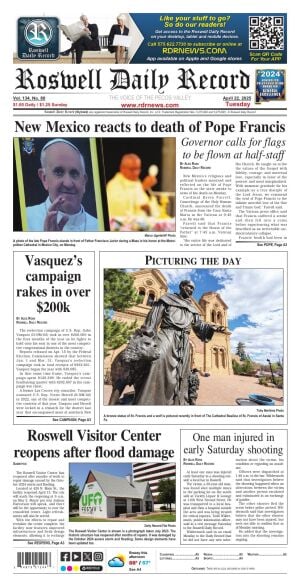A proposal to hike the top royalty rate paid on leases for oil and gas drilling on some parcels of state-managed land in the Permian Basin was among the 32 bills signed into law by the governor in the past two days.
On Thursday, the New Mexico Land Office issued a statement declaring that Gov. Michelle Lujan Grisham (D-NM) had signed 22 bills into law in addition to the 10 she signed on Wednesday.
Today is the deadline for Lujan Grisham to sign or veto laws passed in the recent 60-day session. Lawmakers sent 195 bills to Lujan Grisham before adjourning in March. Those not acted upon by the end of the day will be pocket-vetoed, meaning it automatically will not become law.
As of press time on Thursday, Lujan Grisham had yet to act on about 24 bills, including a $10.8 billion state budget, a $1.2 billion capital outlay appropriations bill and a $113 million tax package.
In all, some 195 bills passed out of the Legislature, of which 157 have been signed and two others vetoed.
Royalty rates
Senate Bill 23 (S.B. 23) represents the first increase in the rate in New Mexico in more than half a century. It authorizes the Land Office to increase from 20% to 25% the top royalty rate that future leaseholders pay to drill from some of the most promising tracts in the oil-rich Permian Basin.
Royalty rates are the amount that producers must pay on the value of oil and gas extracted from land.
Revenue from those royalties from energy development on state trust land is directed into the Land Grant Permanent Fund (LGPF), which each year is distributed to New Mexico public schools, state universities, specialty schools and other beneficiaries.
In a press release on Thursday, Public Land Commissioner Stephanie Garcia Richard lauded the decision, noting that the new rate better reflects the fair market value and matches that which leaseholders can be charged to drill on state land in Texas and private land in New Mexico.
Garcia Richard cites data from the Legislative Finance Committee, which stated that lifting the 20% cap to 25% would result in additional contributions of $50-75 million a year to the LGPF, boosting the amount paid out each year to beneficiaries and increasing the fund's value by up to $2 billion by 2050.
“By bringing the state’s royalty rate for premium oil and gas lands in line with what is charged in Texas and on private lands in New Mexico, we are making a smart business decision,” Garcia Richard said.
Republican lawmakers from Southeast New Mexico and the oil industry have warned that the increased top rate would be an added burden for producers, especially smaller ones who already operate on narrow profit margins.
State Rep. Mark Murphy (R-Roswell), a longtime producer, said that though Texas charges a 25% maximum rate, it offsets that burden by having fewer taxes on production than New Mexico.
During the debate on the bill in the New Mexico House of Representatives, Murphy argued the new rate could be enough to cause those producers to move their operations to other states or onto federal land, where rates are lower.
Anti-racketeering law, Green and Red Chile Month
Other initiatives added to the volumes of state law included Senate Bill 70 (S.B. 70), which expands the crimes that can be charged under the state's anti-racketeering law.
Lujan Grisham backed the bill sponsored by state Sen. Craig Brandt (R-Rio Rancho), which amends the current statute so it can apply to those who face charges of criminal sexual exploitation of a child, criminal sexual penetration, criminal sexual contact, human trafficking, bringing contraband into places of imprisonment, dog fighting and those convicted of cockfighting on three or more occasions.
According to the Cornell Law School Legal Information Institute, racketeering is “a set of illegal activities aimed at commercial profit that may be disguised as legitimate business deals. Racketeering is defined as a coordinated effort by multiple people to earn a profit, typically by fraud, extortion, bribery, threats, violence or other illegal means.”
S.B. 70 cleared the New Mexico House and Senate without opposition.
Lujan Grisham also approved Senate Bill 36 (S.B. 36), which prohibits the New Mexico Tax and Revenue Department and Traffic Safety Bureau within the New Mexico Department of Transportation from disclosing information in most circumstances for the purpose of enforcing federal immigration law.
The same law also limits when a state employee can disclose information about any person's sexual orientation, gender identity, immigration status, whether they have a physical or mental disability, are a crime victim or receive public assistance.
Other laws Lujan Grisham signed Wednesday and Thursday also include Senate Bill 11 (S.B. 11), which requires school districts to craft policies that restrict the use of cell phones and electronic devices by students during instructional hours; House Bill (H.B. 20) to establish a Technology and Innovation Division within the New Mexico Economic Development Department and House Bill 54 (H.B. 54) to require all schools to eventually be equipped with heart defibrillators and have some staff trained in their use.
House Bill 172 (H.B. 172) was signed, which recognizes August in New Mexico as Red and Green Chile Month.
Some of the other bills that were signed on Wednesday and Thursday:
HB 020: Technology & Innovation Division
SB 059: Public Works Minimum Wage Definitions
HB 532: Student Water Safety Guidance
SB 168: Travel Insurance Act
HB 218: Tax Changes
HB 252: Kinship Caregiver Support Pilot Program
HB 156: Increase Educational Salaries
HB 157: New School Licenses
HB 195: School Nurse Salary Tiers & Minimums
HB 487: Protection Of Hispanic Education
SB 133: Educational Retirees Returning to Work
SB 343: Teacher Salary Rates Changes
SB 345: Teacher & Instructional Support Licensure
HB 091: Public Utility Rate Structures
HB 291: Recycling & State's Circular Economy
SB 009: Pipeline Safety Act Violations Civil Penalty
SB 042: Comprehensive Addiction and Recovery Program
SB 045: County Health Care Assistance Fund Use
SB 078: Certified Nurse Anesthetist Role
HB 352: Close & Relocate Certain Magistrate Courts
HB 493: Public Finance Accountability Act
SB 031: Zero-Interest Natural Disaster Loans
SB 036: Sensitive Personal Information Nondisclosure
SB 047: Santa Cruz De La Canada Land Grant
SB 048: Community Benefit Fund
SB 124: Superintendent Of Insurance Subpoenas









